Jakes’ Progress: On Wheels
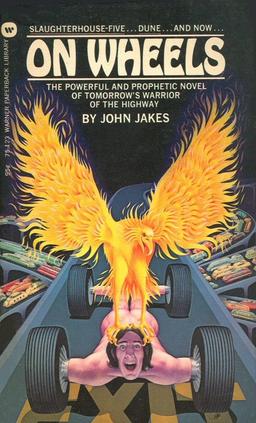 John Jakes is a publishing phenomenon. That is always the first thing mentioned whenever he is written about and will doubtless be the first line of his obituary (not that I’m trying to hurry him). From 1974 through 1979 he produced the eight volumes of The Kent Family Chronicles, which follow the fortunes of an American family from revolutionary times through the end of the nineteenth century. The series has sold over 50 million copies and is still in print, and Jakes followed it with the even more successful North and South trilogy. Appearing from 1982 to 1987 and set in the Civil War era, it tells the story of two closely connected families, the Hazards and the Mains, one from Pennsylvania and the other from South Carolina, as they live through the country’s greatest conflict.
John Jakes is a publishing phenomenon. That is always the first thing mentioned whenever he is written about and will doubtless be the first line of his obituary (not that I’m trying to hurry him). From 1974 through 1979 he produced the eight volumes of The Kent Family Chronicles, which follow the fortunes of an American family from revolutionary times through the end of the nineteenth century. The series has sold over 50 million copies and is still in print, and Jakes followed it with the even more successful North and South trilogy. Appearing from 1982 to 1987 and set in the Civil War era, it tells the story of two closely connected families, the Hazards and the Mains, one from Pennsylvania and the other from South Carolina, as they live through the country’s greatest conflict.
In the succeeding years Jakes has written other books of the same stripe, and while none have generated the huge numbers that either earlier series did, he is still one of America’s most popular authors. He is the reigning master of the American historical blockbuster; his historicals are straightforward, thoroughly researched, expansive in scope (and in page count), and unashamedly, old-fashionedly melodramatic. They are the sort of stories that used to be called “lusty.” Tolstoy they ain’t (and Jakes has never claimed that they are), but they are solid, well-constructed entertainments that deserve their wide success.
But before he became the writer of a New York Times number one bestseller (a distinction earned by North and South, the first volume of the trilogy that bears its name), John Jakes spent his time cranking out yarns about a Conan clone named Brak the Barbarian, and one-off heroic fantasies like The Last Magicians and the humorous Mention My Name in Atlantis, as well as science fiction novels such as the Westworld-flavored Six-Gun Planet (three years before Westworld). None of these books ever made the New York Times bestseller list. Once he glimpsed those green (and I mean green) pastures, Jakes understandably left such low-paying, low-prestige science fiction and fantasy work behind, seemingly forever — he wrote his last fantastic fiction in 1973.
Was his exit from the ranks of the genre any loss? Is there anything to be found in the pre-respectability John Jakes but slapdash schlock? Is any of it still worth reading? Well, brothers and sisters, that’s what I’m here to tell you! And yes, that means that there are spoilers galore in the following review of a forty two year old book. Sue me.
[Click on images for bigger versions.]
The Kent Family Chronicles
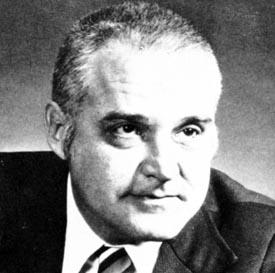
What better place to start with an assessment of John Jakes’ long abandoned early SF/fantasy career than with his ultimate offering in the genre, his 1973 dystopia, On Wheels? We can reasonably assume that it represents everything that he had learned after twenty years of labor in the fields of pulp — “mature” Jakes, if you will.
First things first — that cover! (My copy is the 1973 Warner Paperback Library Edition.) I’m not all that familiar with the work of Don Punchatz, but based on this image, he must be quite a guy. At first I found his painting revolting and disturbing, even as I couldn’t tear my appalled eyes away. Now I kind of like it and find myself musing about it at odd moments. Anyway, believe it or not, Punchatz’s illustration is not the most striking thing about the cover — the blurb at the top is.
It breathlessly shouts:
SLAUGHTERHOUSE FIVE… DUNE… AND NOW… ON WHEELS: THE POWERFUL AND PROPHETIC NOVEL OF TOMORROW’S WARRIOR OF THE HIGHWAY
Whew! Obviously the cybernetic blurb generator at the Warner Paperback Library blew a fuse and shorted out the hyperbole circuit; it apparently didn’t realize that it was setting a very high bar for Jakes to clear.
(By the way, the book was reprinted only once, in 1978, with a much more conventional cover and no mention of books by Vonnegut or Herbert. Too bad; between the naked car-guy and the comparisons to other writers’ great books, I’ll bet the 1973 version really put the butts in the seats, so to speak. On Wheels is currently available as an e-book, together with Six-Gun Planet.)
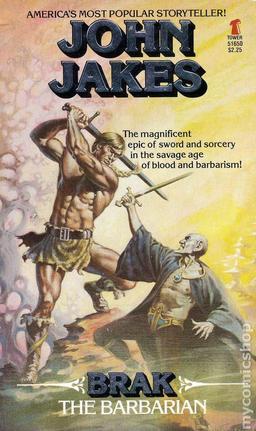 Enough with the frosting — how good is the cake?
Enough with the frosting — how good is the cake?
In On Wheels Jakes imagines a late 21st century USA at the breaking point. The protagonist is Billy Spoiler, a restless young man who is a member of a road clan; the clans make up ten percent of the country’s population, and they live a nomadic existence on the nation’s mammoth twelve and sixteen lane superhighways, traveling an endless circuit that takes them from one end of the country to the other. The clans take their names from various automotive or roadside sources. In addition to Spoilers there are Ramps, Holidays (from Holiday Inns), Tollbooths, Rollbars, Afterburners and so on.
The clans have their own traditions, legends, holidays, and even their own religion — a sort of Baptist flavored techno-evangelicalism, with just a dash of Viking paganism for spice (clan members believe that the last thing they see before they die is the Texaco firebird.) They also have one rigid rule — never stop.
It is the greatest sin to ever come to rest, even for a moment. Even to drop below 40 mph is anathema, and road clan members are born, live their whole lives, and die in constantly moving vehicles. (They contemptuously call the people who live off-road in the cities and who drive just to get to an actual fixed destination “stoppers.”) They eat, sleep, recreate, and work in enormous multi-deck communal vans, equipped with apartments, stores, chapels, bars… even basketball courts.
Silly as it sounds, Jakes works it all out beautifully. The highways are equipped with magnetic strips, so that vehicles can essentially go on “autopilot” whenever desired, and clan members move between the vans for social or business purposes in their own individual vehicles, which are stored in huge bays in the vans when not in use.
All clan members receive a government subsidy check every month, enabling them to live their rootless lives, and they consider themselves the freest and most independent people in the world. (They certainly don’t seem to worry much about the meaningless and decades-long Asian War that the United States is permanently embroiled in.)
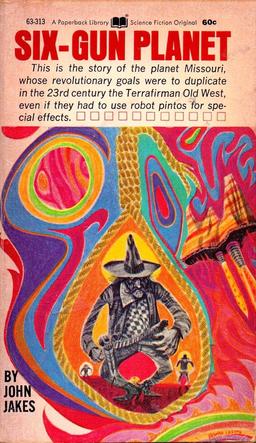 Even with all of Jakes’ ingenuity, the premise is inarguably a stretch (and the book is clearly a product of the early 70’s, before the oil crisis and gas lines that hit so hard just a few years later), but he keeps the story speeding along so smoothly that there isn’t time to worry about implausibilities.
Even with all of Jakes’ ingenuity, the premise is inarguably a stretch (and the book is clearly a product of the early 70’s, before the oil crisis and gas lines that hit so hard just a few years later), but he keeps the story speeding along so smoothly that there isn’t time to worry about implausibilities.
But the book has strengths beyond simple drive and narrative efficiency (which is never as simple as it seems). Jakes does unexpected things with his premise; not content to safely stay on the main highway, he takes the reader on some surprising and risky detours. Billy is perceptive enough to feel a vague discontent with the supposedly unfettered clan life; he can’t avoid sensing its ultimate aimlessness. He can’t help but wonder sometimes what the point of all the movement is, and a large part of the story is taken up with his struggle to escape the monotony and meaninglessness of his life through an impulsive mismatched marriage with a girl he meets at a multi-clan get-together. (The vans are designed so as to be able to match speeds and lock together; side sections can then be removed, making large internal spaces for meetings and parties.)
Jakes’ description of Billy’s and Sue Ann’s doomed relationship has a real sadness and pain in it; they consistently misread and misunderstand each other, and they flail at and fail each other in all the foreordained ways. Jakes’ picture of a pair of too-young people who never should have gotten married has a weight and seriousness to it that is rare in this sort of book.
Billy ultimately affirms his status as a loser when he inadvertently discovers the clans’ real situation — they only think never stopping is their idea and their tradition; really, the government won’t permit them to ever stop. (Billy finds this out when Sue Ann is dying and a mobile clan doctor isn’t available; he decides to violate the ultimate taboo and get off the highway to find a stationary hospital, but is prevented by the police from doing so).
The country is so overpopulated that if millions more were added to the overstrained mega-cities, the whole social structure would instantly collapse. At the same time, the economy — civilian and military — is so dependent on the auto industry (which by this time has consolidated into a single corporation that is, for all intents and purposes, the U.S. government) that the nation’s car addiction cannot be reversed or even mitigated in any way.
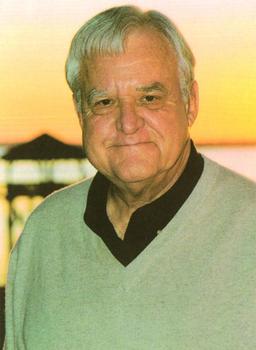
Billy’s victory in gaining the understanding that he has yearned for is really just a final defeat, and the ending, where he finally sees the firebird in a pointless automotive duel with a rival clan member, is perfectly judged; it has a surprisingly strong impact.
So… is On Wheels up there with Slaughterhouse Five or Dune?
No, of course not. But it does turn out to be a surprisingly serious and somber book, and a very barbed satirical variation on the old statement, “What’s good for General Motors is good for the country.” It is a genuine science fiction vision, and with its theme of deceived passengers on a trip to nowhere, and its elements of conceptual breakthrough, it bears more than a passing resemblance to generation starship tales like Robert Heinlein’s Universe or Brian Aldiss’ Non-Stop.
On Wheels is good enough to make you wish that John Jakes had refrained from putting all of his eggs in the historical saga basket (of course, his accountant would disagree), though the book’s evident ambition, dark vision, and depth of feeling are perhaps clues as to why he gave up writing science fiction and fantasy paperback originals in the first place.
It wouldn’t be surprising if he had reached a point where he just felt too limited by such constricting formats. He was also likely tired of being poor.
Just before he went out the door, though, John Jakes gave us On Wheels, never destined to be a bestseller or cult classic, but still a worthy work to exit with, and a welcome reminder of the unexpected pleasures that can often be found between the gaudy covers of forgotten paperbacks.

“On Wheels” was the first book by Mr. Jakes I ever read, way back in 1974 (and it’s the same version as yours pictured here; I still have it, too, although it suffered some slight cover damage thanks to improper storage on my part). I’ve read 5 other titles of his since then, most recently “Time Gate,” which began like a pedestrian juvenile, but actually got better as the novel progressed. I also had the good fortune to meet Mr. Jakes a few years after reading “On Wheels,” when he agreed to come visit a science fiction group I met with once a month or so during the late 1970s (we often met in Dayton, Ohio, in the home of Joe Patrouch, a teacher at UD, who’d written a critical appreciation of Isaac Asimov). Mr. Jakes was one of the nicest people I’ve ever met in my life, and it was a true pleasure to be able to tell him how much I’d liked “On Wheels” and to be able to do so in complete sincerity. It’s great to see someone else has discovered how much fun it was, too.